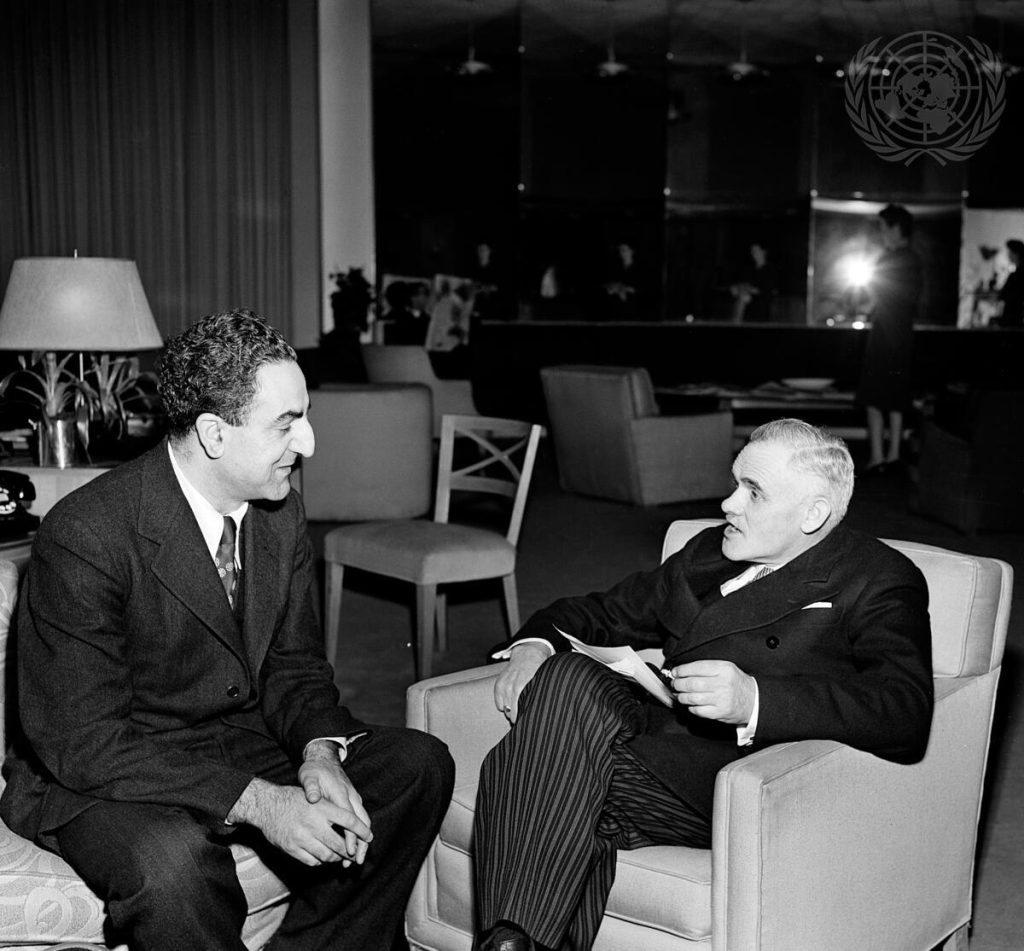
Renae Barker is a senior lecturer at the University of Western Australia Law School. This post is excerpted from an article in the December 2023 special issue of The Review of Faith & International Affairs commemorating the 75th anniversary of the Universal Declaration of Human Rights.
Colonel William Roy Hodgson is a forgotten figure from the drafting of the Universal Declaration of Human Rights—forgotten not just at the international level but also in his home country of Australia, where even in his own lifetime “his presence was virtually ignored” [1] when he finally returned to Australia at the end of a long and distinguished diplomatic career. In the year of the 75th anniversary of the signing of the Universal Declaration of Human Rights (UDHR), it is time his contribution and legacy were rediscovered.
Colonel Hodgson was Australia’s representative to the UN Human Rights Commission and a member of the UDHR drafting committee alongside other, much more well-known figures such as Eleanor Roosevelt, Dr. Peng-Chun Chang, and Dr. Charles Malik. While he was a man of intelligence with, as one U.S. State Department memo noted, “a very thorough knowledge of the question under consideration” [2], neither his intellect nor his vast knowledge of international relations was his greatest contribution to the Universal Declaration of Human Rights. Rather his contribution came from his background as a soldier and “his practical and common-sense approach” [3].
For Colonel Hodgson, enforcement was key to the international human rights project. Throughout the development of the Universal Declaration, he fought for the inclusion of mechanisms to make the obligations contained therein more than mere “pious resolution”; he wanted the document to have “teeth” [4]. During debates within both the Human Rights Commission and the drafting committee, he consistently raised the issue of enforcement, insisting that the matter remain on the agenda even when others felt it would be better to prioritize building international consensus for the human rights project before broaching the issue of enforcement [5].
Colonel Hodgson’s desire to see human rights enforced via international courts or tribunals came from his experience of war. As a witness to two world wars, one as a combatant and the other as the first secretary of Australia’s fledgling Department of External Affairs, he knew the cost. He feared that as weapons advanced, future war could “wipe out whole populations if not civilization itself” [6]. As the preamble of John Humphrey’s first draft of an international bill of rights acknowledges, “there can be no human freedom or dignity unless war and the threat of war is abolished” [7]. For Hodgson, removing the threat of war and enforcing respect for human rights were intimately linked.

Ultimately, the Universal Declaration of Human Rights did not contain enforcement mechanisms. Hodgson’s views were, arguably, ahead of his time. The first stirrings of enforceable international human rights obligations came in 1959 with the establishment of the European Court of Human Rights. Truly international enforcement mechanisms did not appear until the International Covenant on Civil and Political Rights (ICCPR) came into effect in 1976, almost 30 years after the passage of the UDHR. Colonel Hodgson did not live to see international human rights embrace enforcement mechanisms. He died in 1958.
While human rights are now enforceable at the international level, Colonial Hodgson’s home nation of Australia remains one of the few, if not the only one of the Western democratic nations without a national bill or charter of rights [8]. That is not to say that human rights in Australia are not protected. Rather than being protected by a single national human rights framework, they are protected via a patchwork of laws operating at both the federal and state level. This includes some state-based legislative charters of rights [9]. Indeed most Australians enjoy a comparatively high level of respect for their human rights. However, this experience is not universal. Australia has been found by the UN Human Rights Committee to have violated the provisions of the ICCPR on several occasions. This has occurred most frequently and notably in relation to the treatment of refugees and Australia’s indigenous peoples [10]. The ICCPR is not directly enforceable in the dualist nation of Australia; victories for plaintiffs seeking enforcement are only effective if the executive or legislature chooses to act. This can leave Australia’s most vulnerable people with few options to enforce human rights. The ongoing indefinite detention of some refugees and the high levels of poverty and disadvantage experienced by Australia’s indigenous communities continue to rob people of their human dignity.
In the year of the 75th anniversary of the UDHR, Australia and the international community need to rediscover the legacy of Colonel William Roy Hodgson and embrace the enforcement of human rights to achieve human dignity for all. Human rights must be more than pious pronouncements; they must be given real “teeth.” If we fail, then as Hodgson argued, “the people of the whole world would be disappointed.”
References:
[1] Paul Hasluck, Diplomatic Witness: Australian Foreign Affairs 1941–1947 at 239 (Melbourne University Press 1980).
[2] Mary Anne Glendon, A World Made New: Eleanor Roosevelt and the Universal Declaration of Human Rights 38 (Random House Trade Paperbacks 2002).
[3] Death of Col. W. R. Hodgson, Canberra Times, 25 Jan. 1958, at 2.
[4] Lt.-Col. W. R. Hodgson: Australia’s Brisk Delegate at United Nations, The Age, 16 Aug. 1947, at 2.
[5] Glendon, supra n. 2.
[6] Our Minister to France, Smith’s Weekly, 26 May 1945.
[7] Thomas Finegan, Conceptual Foundations of the Universal Declaration of Human Rights: Human Rights, Human Dignity and Personhood 37 Australian J. Legal Phil. 182, 198–199 (2012).
[8] Louise Chappell, John Chesterman & Lisa Hill, The Politics of Human Rights in Australia 27–29 (Cambridge University Press 2009).
[9] Renae Barker, State and Religion: The Australian Story 105–09 (Routledge 2019); Renae Barker, Freedom of Religion Without a Bill of Rights: Australia’s Peculiar Approach to Tackling Freedom of Religion and Other Human Rights Issues, inFreedom of Religion or Belief: Creating Constitutional Spaces for Fundamental Freedoms 109, 109–30 (Paul Babie, Neville Rochow & Brett Scarffs eds., Edward Elgar Publishing 2020).
[10] Australian Human Rights Comm’n, Case Studies: Complaints Involving Australia (2009).
